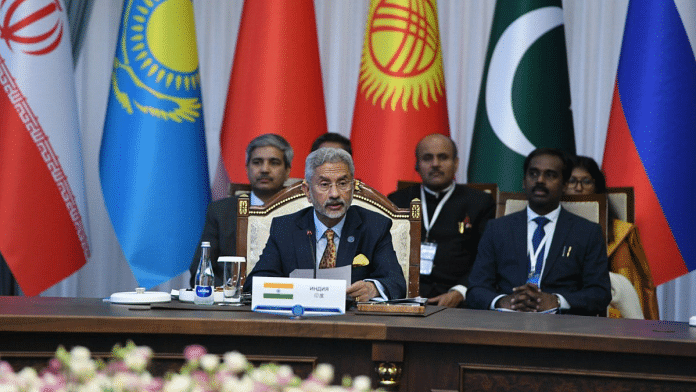New Delhi: Connectivity projects should respect the sovereignty and territorial integrity of all countries and the “Global South” should not be burdened with “unviable debt arising from opaque initiatives”, India’s Minister for External Affairs S. Jaishankar said Thursday.
The Global South generally refers to countries often characterised as developing, less developed, or underdeveloped and primarily located in Africa, Asia, and Latin America.
In his remarks at the Shanghai Cooperation Organisation (SCO) Summit in Bishkek, Kyrgyzstan, Jaishankar also batted for the India-Middle East-Europe Economic Corridor (IMEC), which has largely been viewed as a counter to China’s Belt and Road Initiative (BRI).
“I’m confident that the India-Middle East-Europe Economic Corridor (IMEC) and the International North-South Transport Corridor (INSTC) could become (an) enabler in bringing economic prosperity to the region,” he said.
Originally established in 1996 between China and Central Asian states as the Shanghai Five, SCO is now a nine-member group comprising China, India, Russia, Pakistan, Kazakhstan, Kyrgyzstan, Tajikistan, and Uzbekistan, with leading oil producer Iran officially joining in July this year. Belarus is keen to join as well.
The IMEC, envisaged as a ship-to-rail transit network with India, the US, Saudi Arabia, UAE, and the European Union (EU) as partners, was announced on the sidelines of the G20 Leaders’ Summit in Delhi last month. A day later, China said it welcomed the initiative so long as it doesn’t become a “geopolitical tool”, and attempted to downplay Italy’s plan to pull out of BRI.
On the other hand, the INSTC is a 7,200-km-long multi-modal transportation corridor, established in 2000 by Iran, Russia, and India and later expanded to include 10 other countries, with Bulgaria as the observer state. However, American sanctions against Tehran have led to snags and financial challenges.
Meanwhile, Chinese Premier Li Qiang held bilateral meetings with Central Asian leaders, including Kyrgyz President Sadyr Japarov, on the sidelines of the SCO summit, where he talked about the further promotion and development of the BRI.
“China is ready to work with Kyrgyzstan to give full play to industrial complementarity and expand the scope and scale of economic and trade cooperation with a focus on high-quality Belt and Road cooperation,” read a statement from the Chinese government after Li and Japarov’s meeting.
Last week, China held the third BRI forum in Beijing, which saw the attendance of Russian President Vladimir Putin and others, but fewer world leaders than seen in the past.
Also Read: Why India’s SCO membership still matters as China strengthens its hand in Central Asia
‘Mutually beneficial & financially viable solutions’
At the SCO meeting, Jaishankar also talked about the importance of projects that are mutually beneficial to all states and adhere to international law.
“SCO should work together to promote stability and prosperity in the region by strictly adhering to the principles of international law, respecting (the) sovereignty and territorial integrity of each other, and encouraging economic cooperation,” he said in his address.
India, he added, was keen to partner with other member states “for sustainable, mutually beneficial and financially viable solutions”.
Earlier in May, at the SCO Foreign Ministers Meet in Goa, the China-Pakistan Economic Corridor (CPEC) — which is part of BRI — was also a topic of conversation.
While then-Pakistan Foreign Minister Bilawal Bhutto said CPEC can be a force multiplier for regional connectivity, Jaishankar retorted countries shouldn’t “get caught up in weaponising terrorism” and that any project in the region must come with respect for the sovereignty and territorial integrity of all member states.
New Delhi has repeatedly expressed opposition to the CPEC and expansion plans arguing that it passes through Pakistan-occupied Kashmir and thereby violates India’s territorial integrity.
(Edited by Uttara Ramaswamy)
Also Read: Ahead of SCO meet, differences emerge in readouts of Modi-Putin phone call on Wagner mutiny



